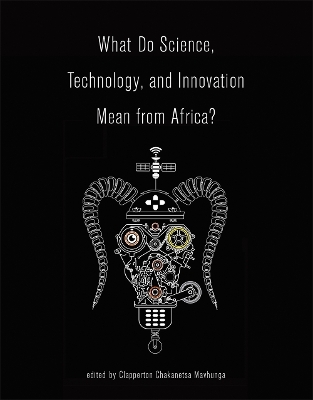
What Do Science, Technology, and Innovation Mean from Africa?
Seiten
2017
MIT Press (Verlag)
978-0-262-53390-4 (ISBN)
MIT Press (Verlag)
978-0-262-53390-4 (ISBN)
- Keine Verlagsinformationen verfügbar
- Artikel merken
Explorations of science, technology, and innovation in Africa not as the product of "technology transfer" from elsewhere but as the working of African knowledge.
In the STI literature, Africa has often been regarded as a recipient of science, technology, and innovation rather than a maker of them. In this book, scholars from a range of disciplines show that STI in Africa is not merely the product of "technology transfer" from elsewhere but the working of African knowledge. Their contributions focus on African ways of looking, meaning-making, and creating. The chapter authors see Africans as intellectual agents whose perspectives constitute authoritative knowledge and whose strategic deployment of both endogenous and inbound things represents an African-centered notion of STI. "Things do not (always) mean the same from everywhere," observes Clapperton Chakanetsa Mavhunga, the volume's editor. Western, colonialist definitions of STI are not universalizable.
The contributors discuss topics that include the trivialization of indigenous knowledge under colonialism; the creative labor of chimurenga, the transformation of everyday surroundings into military infrastructure; the role of enslaved Africans in America as innovators and synthesizers; the African ethos of "fixing"; the constitutive appropriation that makes mobile technologies African; and an African innovation strategy that builds on domestic capacities. The contributions describe an Africa that is creative, technological, and scientific, showing that African STI is the latest iteration of a long process of accumulative, multicultural knowledge production.
Contributors
Geri Augusto, Shadreck Chirikure, Chux Daniels, Ron Eglash, Ellen Foster, Garrick E. Louis, D. A. Masolo, Clapperton Chakanetsa Mavhunga, Neda Nazemi, Toluwalogo Odumosu, Katrien Pype, Scott Remer
In the STI literature, Africa has often been regarded as a recipient of science, technology, and innovation rather than a maker of them. In this book, scholars from a range of disciplines show that STI in Africa is not merely the product of "technology transfer" from elsewhere but the working of African knowledge. Their contributions focus on African ways of looking, meaning-making, and creating. The chapter authors see Africans as intellectual agents whose perspectives constitute authoritative knowledge and whose strategic deployment of both endogenous and inbound things represents an African-centered notion of STI. "Things do not (always) mean the same from everywhere," observes Clapperton Chakanetsa Mavhunga, the volume's editor. Western, colonialist definitions of STI are not universalizable.
The contributors discuss topics that include the trivialization of indigenous knowledge under colonialism; the creative labor of chimurenga, the transformation of everyday surroundings into military infrastructure; the role of enslaved Africans in America as innovators and synthesizers; the African ethos of "fixing"; the constitutive appropriation that makes mobile technologies African; and an African innovation strategy that builds on domestic capacities. The contributions describe an Africa that is creative, technological, and scientific, showing that African STI is the latest iteration of a long process of accumulative, multicultural knowledge production.
Contributors
Geri Augusto, Shadreck Chirikure, Chux Daniels, Ron Eglash, Ellen Foster, Garrick E. Louis, D. A. Masolo, Clapperton Chakanetsa Mavhunga, Neda Nazemi, Toluwalogo Odumosu, Katrien Pype, Scott Remer
Clapperton Chakanetsa Mavhunga is Associate Professor of Science, Technology, and Society at MIT. He is the author of Transient Workspaces: Technologies of Everyday Innovation in Zimbabwe and the editor of What Do Science, Technology, and Innovation Mean from Africa?, both published by the MIT Press. Clapperton Chakanetsa Mavhunga is Associate Professor of Science, Technology, and Society at MIT. He is the author of Transient Workspaces: Technologies of Everyday Innovation in Zimbabwe and the editor of What Do Science, Technology, and Innovation Mean from Africa?, both published by the MIT Press. Has two university addresses
| Erscheinungsdatum | 18.07.2017 |
|---|---|
| Reihe/Serie | What Do Science, Technology, and Innovation Mean from Africa? |
| Zusatzinfo | 25 b&w illus. |
| Verlagsort | Cambridge, Mass. |
| Sprache | englisch |
| Maße | 178 x 229 mm |
| Themenwelt | Geisteswissenschaften ► Geschichte ► Regional- / Ländergeschichte |
| Geschichte ► Teilgebiete der Geschichte ► Technikgeschichte | |
| Naturwissenschaften | |
| ISBN-10 | 0-262-53390-1 / 0262533901 |
| ISBN-13 | 978-0-262-53390-4 / 9780262533904 |
| Zustand | Neuware |
| Haben Sie eine Frage zum Produkt? |
Mehr entdecken
aus dem Bereich
aus dem Bereich
Buch | Softcover (2024)
Lehmanns Media (Verlag)
19,95 €
Digitalisierung neu denken für eine gerechte Gesellschaft
Buch | Hardcover (2023)
Quadriga (Verlag)
20,00 €
Vom Perceptron zum Deep Learning
Buch | Softcover (2022)
Springer Vieweg (Verlag)
19,99 €


